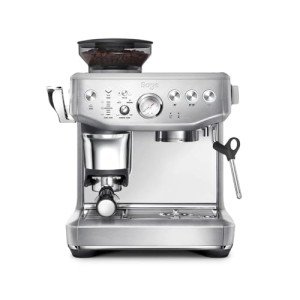The Rise of Home Espresso Machines: A Comprehensive Guide
As coffee enthusiasts continue to look for fresh and tasty brews in the house, the popularity of home espresso machines has surged in recent years. No longer just the domain of coffee shops and coffee shops, these machines empower individuals to craft barista-quality espresso drinks from the comfort of their kitchens. This short article will check out the different types of home espresso machines, their features, and considerations for selecting the best one. In addition, it will supply a selection of FAQs to assist prospective purchasers make informed choices.
Types of Home Espresso Machines
Home espresso machines can be categorized into several classifications based on their mechanisms and user-friendliness. Each type has its special features, pros, and cons.
| Type | Description | Pros | Cons |
|---|---|---|---|
| Manual Espresso Machines | Requires the user to manually control the developing procedure, including methods like pulling a lever to develop pressure. | - Complete control over developing procedure - Compact design | - Requires ability and practice - Time-consuming |
| Semi-Automatic Machines | Machine automates water flow and pressure, however the user still controls the dosing and period of the developing procedure. | - Balance of automation and control - Versatile | - Learning curve for perfecting strategies |
| Fully Automatic Machines | Automates the entire brewing process, from grinding to developing, frequently with programmable settings for customized beverages. | - Extremely user-friendly - Quick and practical | - Less control over the brewing process - Higher price point |
| Capsule or Pod Machines | Utilizes pre-packaged espresso pills or pods to produce coffee rapidly and easily. | - Extremely easy to use - Minimal cleanup | - Limited taste variety - More pricey per cup than ground coffee |
| Super-Automatic Machines | Combines functions of totally automatic machines with integrated mills, enabling users to brew entire bean espresso and milk-based drinks with one touch. | - All-in-one convenience - Ideal for milk-based drinks | - Often the most expensive - Can be bulky |
Features to Consider
When picking a home espresso machine, possible buyers need to think about the following functions to ensure they select a machine that meets their needs:
Grinder Type:
- Built-in mills can supply fresher grounds however might need more upkeep.
- Separate grinders enable more personalization of grind size.
Pressure:
- Look for machines that produce a minimum of 9 bars of pressure, which is ideal for brewing espresso.
Water Temperature Control:
- Machines with adjustable temperature settings enable better extraction of flavor from beans.
Milk Frothing Options:
- Consider whether you desire a manual steam wand for frothing or an automatic milk frother for convenience.
Reduce of Cleaning:
- Machines with detachable parts and self-cleaning functions considerably decrease cleanup time.
Size and Design:
- Ensure the machine fits conveniently in your kitchen and aligns with your aesthetic choices.
Budget:
- Set a budget before beginning your search, as costs can range significantly from affordable models to high-end machines.
Benefits of Home Espresso Machines
Owning a home espresso machine uses various advantages:
- Cost-Effective: Over time, brewing espresso at home can save coffee enthusiasts money compared to regular coffee shop visits.
- Modification: Users can explore various beans, grind sizes, and developing methods to find their best cup.
- Convenience: The capability to brew espresso whenever removes the requirement to head out to a café, particularly beneficial throughout late nights or mornings.
- Quality Control: With a home machine, individuals have complete control over the quality of ingredients and brewing procedures.
Drawbacks of Home Espresso Machines
However, there are some drawbacks to consider:
- Initial Investment: High-quality espresso machines can be costly, needing a substantial in advance financial investment.
- Knowing Curve: Mastering the art of espresso brewing can take some time and practice, which might be intimidating for novices.
- Upkeep: Like any appliance, espresso machines require regular cleansing and maintenance to guarantee optimum performance.
Frequently asked questions
1. What is Pod Espresso Machines of home espresso machine for novices?
Response: For beginners, a semi-automatic machine is often advised as it uses a balance in between control and automation, allowing you to discover the essentials without frustrating complexity.
2. How much should I invest on a home espresso machine?
Answer: Entry-level machines can begin around ₤ 100 to ₤ 300, while higher-end models can range from ₤ 500 to over ₤ 2000. It's vital to set a budget based on your anticipated usage and wanted functions.
3. Do I need a different grinder?
Answer: While some espresso machines include built-in grinders, purchasing a different grinder permits higher personalization and ensures much better quality premises.
4. How often should I clean my espresso machine?
Response: Cleaning frequency can differ by machine type, but it's normally recommended to clean the machine after each use and perform deep cleansings weekly or regular monthly, depending on use.
5. Can I make milk-based beverages with any espresso machine?
Response: Not all machines come with milk frothing capabilities. If you enjoy drinks like lattes or cappuccinos, search for a machine with a steam wand or automatic frother.
Home espresso machines are transforming the method coffee enthusiasts enjoy their precious brews. With various types and advanced features readily available in the market, there is something for everybody. Whether it's the delight of producing distinct dishes or simply enjoying the ideal shot of espresso, purchasing a home espresso machine can improve both the coffee-drinking experience and the lifestyle for coffee fans all over. As with any investment, it is vital to weigh the advantages versus the potential downsides and choose a machine that seamlessly fits both your way of life and preferences.

